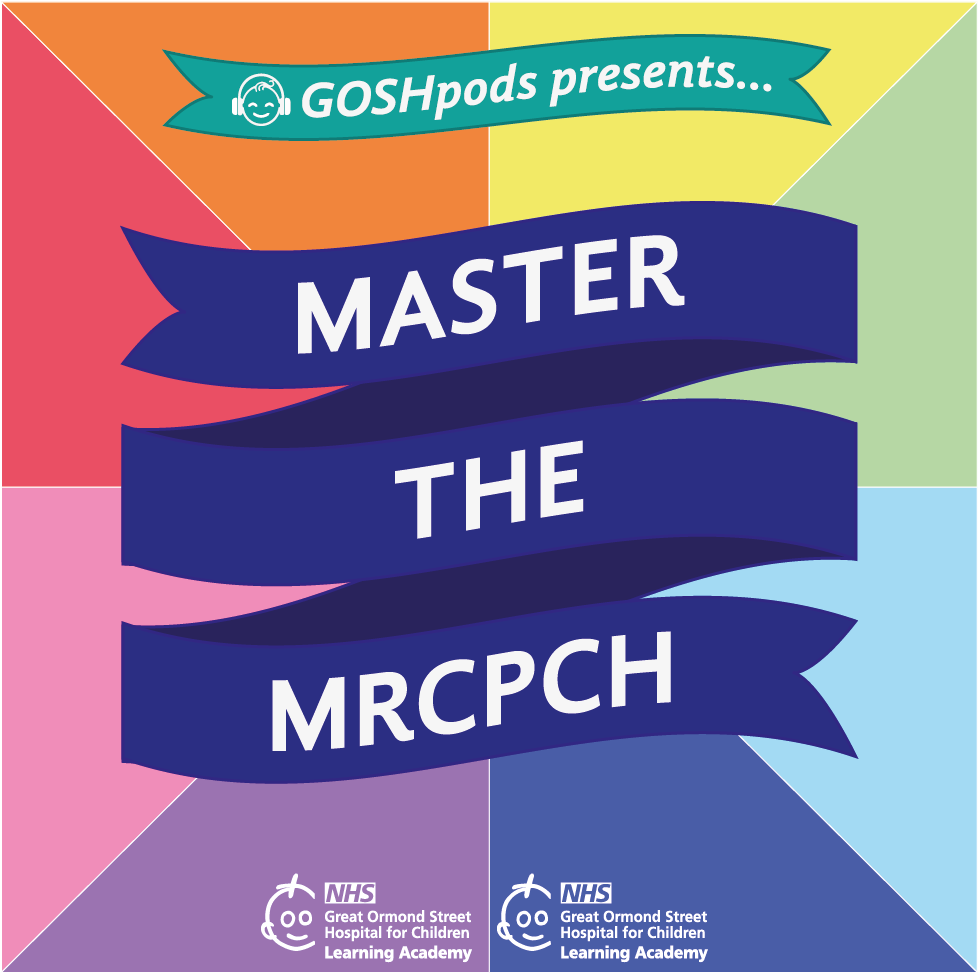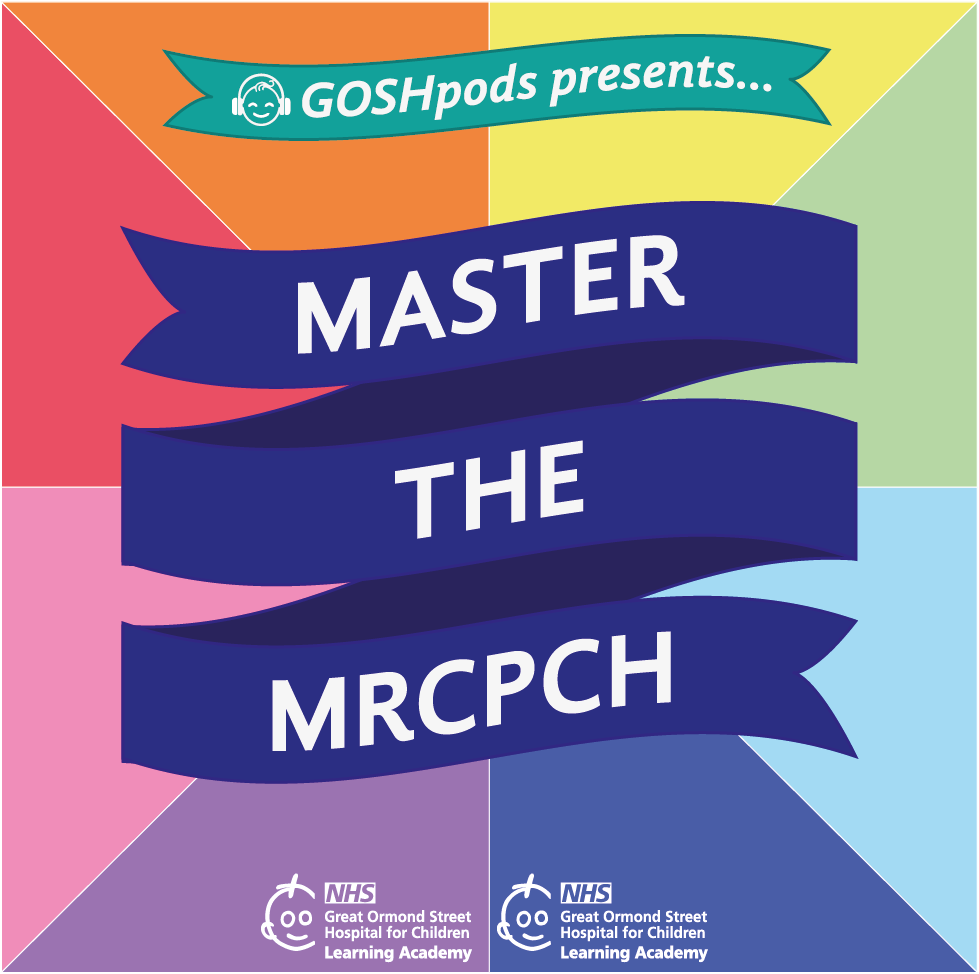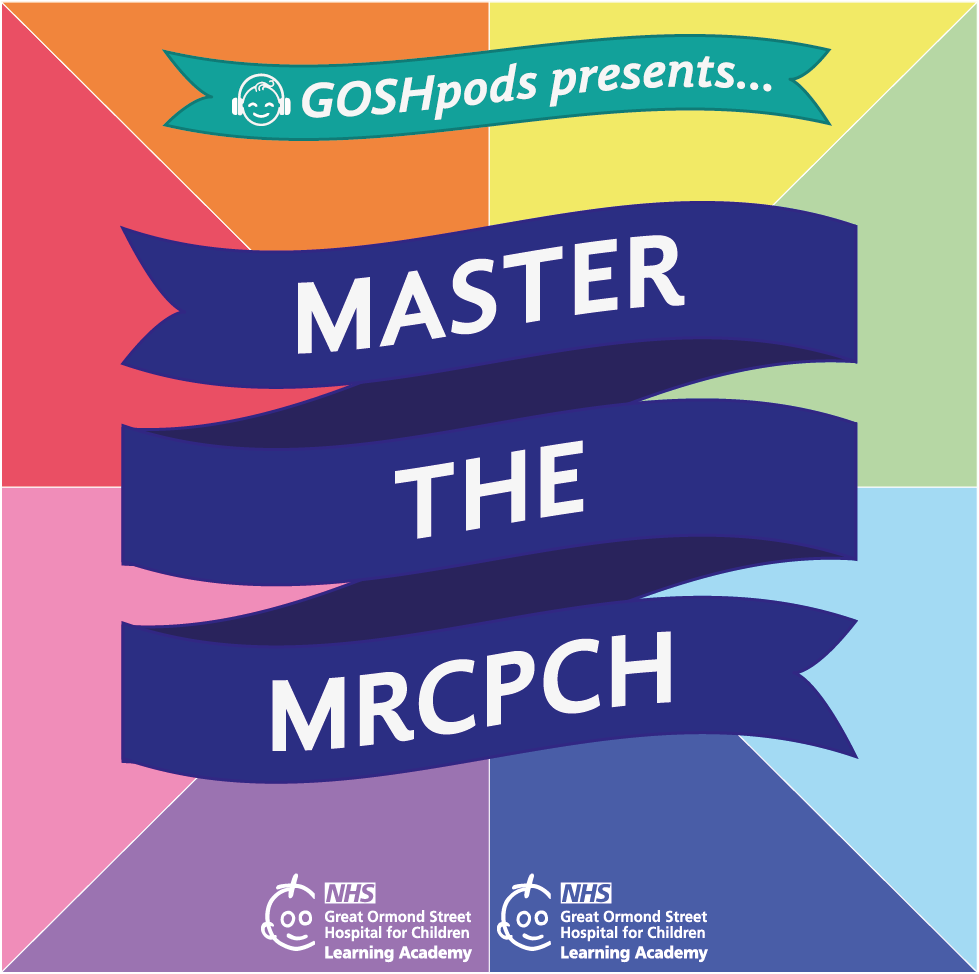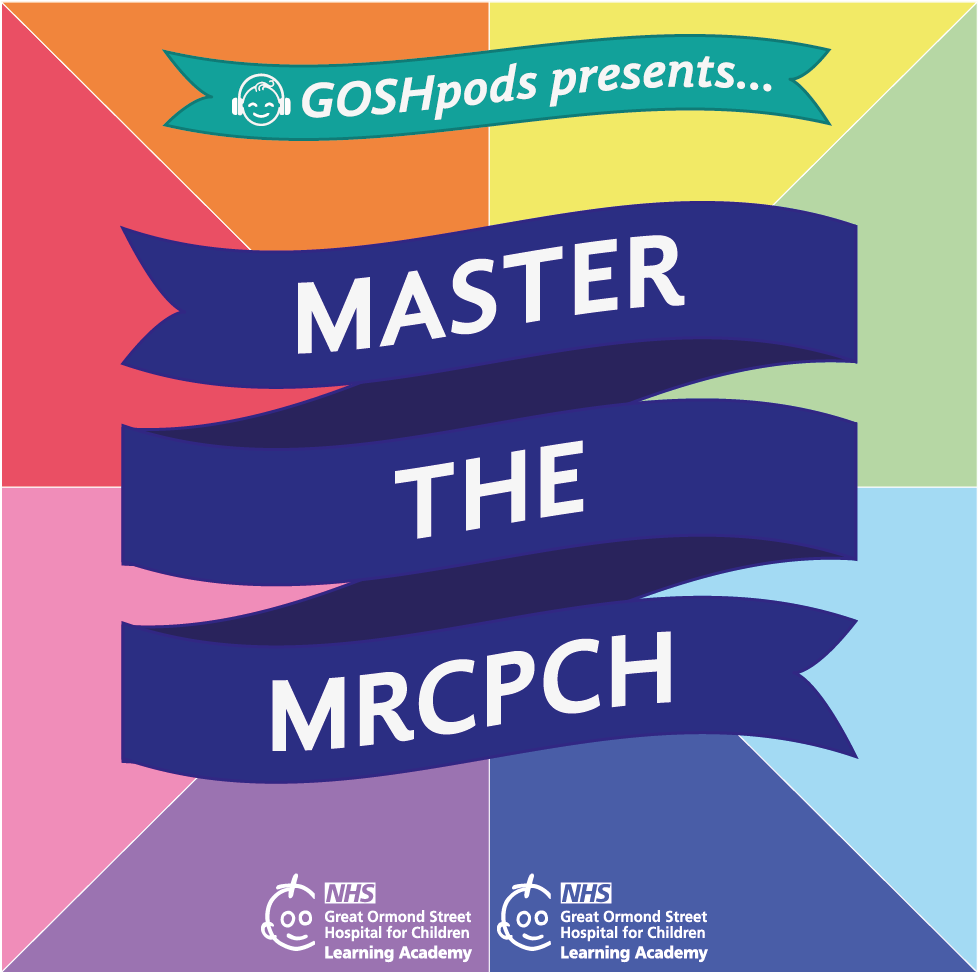This Podcast is brought to you by the GOSH Learning Academy.
SA: Hello, and welcome to Master the MRCPCH. In this series, we tap into the expertise here at Great Ormond Street Hospital to give you an overview of a topic on the RCPCH exam curriculum. So whether you're revising for an exam or just brushing up on a need to know topic. Hopefully this podcast can give you the information that you need.
I'm Dr. Sarah Ahmed, a paediatric registrar and the current digital learning education fellow here at GOSH.
In today's episode, we're going to talk to Dr. Maria Gogou, friend of the show and a Senior Clinical Fellow in Neurology at Great Ormond Street Hospital. We're going to be talking about non-epileptic seizures, which comes under the neurology section of the exam curriculum.
Thank you, Maria, for coming back on the show today.
MG: Hello, Sarah. Happy to be here.
SA: So before we delve into more detail, I wanted to start by asking, what would you like people to get out of this podcast?
MG: Well, first thing I would like people to realize how important it is to diagnose promptly a non-epileptic seizure. I would like them to be familiar with features of which are suggestive of a non-epileptic event and also to introduce them to the basic concepts of what supportive treatment means for those people.
SA: Wonderful. And I'm sure we'll cover all of that today.
MG: Let's see.
SA: So let's start at the very beginning. What are non-epileptic seizures and is that even the right way of describing the condition?
MG: If I had to give a definition about that, I would just say that non-epileptic seizures are events, paroxysmal events or episodic events with symptoms which look like seizures. But in fact, they are not associated with any abnormal electric brain activity. So they look like seizures a lot, but they are not epileptic seizures.
And there are many other words we use to describe them, like psychogenic seizures or dissociative seizures. And non-epileptic seizures, on the whole, fall within what we call a functional neurological disorder.
SA: And I do think this is something that we're seeing more and more. Do you have an idea of the epidemiology, the numbers of kids who present with non-epileptic seizures?
MG: In fact, I think that we see more and more because nowadays we are more able to diagnose this condition and fortunately, more and more clinicians are aware of the existence of this entity. So this condition has a name now.
In general, they are not more uncommon compared to other neurological conditions like multiple sclerosis, for instance. There are studies which estimate that their prevalence might be between one to three for every 100,000 of people. But there are other studies which give higher rates.
It is important to mention that non-epileptic seizures are a very frequent cause of difficult to treat epilepsy. What I mean is that up to 20 or 30% of patients, of children, with epilepsy who are referred to tertiary centres for drug resistant seizures, in fact, they do have non epileptic events, which is a quite high number if you think that this affects one out of three of those patients.
And also it is important to remember that there are cases of children or adolescents who can have both epileptic and non-epileptic seizures. And this can be up to 10 percent among the total number of children with epilepsy.
SA: I, I really didn't appreciate how high the numbers were in everything that you just mentioned. And so it's great that people are becoming more and more aware of this as a distinct condition. So what causes a non-epileptic seizure?
MG: In general, we don't have a clear explanation for that and a definite pathophysiological mechanism. However, there is increasing evidence that people with non-epileptic seizures have altered patterns of functional connectivity between different areas of their brain. There is also evidence that they may have a reduced connectivity between frontal cortex and subcortical areas. And this is related to the word dissociative we use sometimes to describe those events, which implies a dissociation between cortical and subcortical function. But in general, as I said, we don't have a clear explanation and there are still ongoing research in this field.
If we have a close look at the epidemiological traits of those children, we will see that very frequently they have neurodevelopmental problems, autism spectrum disorder, they often have mental health difficulties, and they have experienced traumatic or stressful events. So, in general, there are some risk factors which increase the risk for exhibiting non epileptic seizures.
SA: And how do these children present?
MG: Well, non-epileptic seizures can mimic many different types of seizures. Convulsive seizures, tonic clonic seizures, absences, or even atonic seizures. I said before that they fall within what we call functional neurological disorder. We need to have in our mind that in this situation people can present a symptom, any symptom. So from this point of view, the clinical presentation of a non-epileptic event can vary a lot. And it is interesting that among children who also have epilepsy, sometimes the non-epileptic events tend to be quite similar to the real seizures.
SA: And so how do you differentiate between a, in inverted commas, “regular” seizure and a non-epileptic seizure?
MG: This is really very challenging sometimes. It's not a straightforward answer. However, it is really important to be done promptly in order to avoid unnecessary treatment. And I have to share with you that there are cases of people, children, or even adult patients, who have been even intubated and admitted to intensive care unit because they were considered to have seizures, but in fact, they had non epileptic events. So you understand how important it is.
It is quite helpful to have in our minds some features which are suggestive of a non-epileptic attack, and I will start by the duration of the event. On the whole, the longer the duration, the more likely it is to be non-epileptic. Although, of course, there are exceptions. A general rule of thumb says that if the duration of the event is more than five minutes, then it is even 20 times more likely this event to be non-epileptic rather than epileptic. Of course, we can also see quite long epileptic seizures, but this is a general rule. Also, in the case of an event with clear motor manifestations, non-epileptic attacks are characterised by random jerky movements which are different form real tonic-clonic seizures.
Another important thing is the course, the progress of the event. In non-epileptic seizures we very frequently witness a wax and wane pattern, a fluctuating course during the event, which is not the case in the majority of cases of epileptic seizures.
It is also very important to try and notice the eye contact of the patient while they are having the attack. For instance, are they able to look around and be distracted by environmental stimuli in the room? This is against an epileptic seizure.
It is important to see if the intensity and the course of the event is affected by various factors, like if someone can can speak to the child and this alleviate the symptoms, or the opposite, if someone enters the room and this worsens the course of the event. Again, this is something pointing toward a non-epileptic event.
Another useful parameter is urinary incontinence and and injuries during the event. They are extremely rare among patients with non-epileptic seizures.
After the event, it is sometimes helpful to try and see if the patient has any recall, any memory of the event. The more detail the recall is the more likely it is to represent a non-epileptic event. Or when we're in front of a patient with an event and we're not sure about the exact nature of the event, it's important to say a few words to provide some clues. And after the termination of the event to check if they have any memory of those words, which is again supportive of a non-epileptic attack.
In addition, things like postictal headache or postictal fatigue and sleepiness are quite rare after a non-epileptic event, but they are quite frequent after a epileptic seizure.
Non epileptic seizures tend to appear in children after school age, like, older than 8 years. So, they are quite rare, in a very young child. This is important for differential diagnosis. An other important clue is reproduction of non-epileptic attacks by suggestion.
Also, in patients with both type of events, the non epileptic events are slightly different from their usual seizures. That's how you suspect them.
So all those clues could help us in clinical practice and differentiate between an epileptic and non-epileptic event.
Nevertheless, I have to say that none of those things that I have already mentioned has a hundred percent sensitivity or specificity. So there are always exceptions which break the rules. And for this reason, we need to have a quite open, open mind. I would say that the only thing that would perhaps be a hundred percent suggestive of a epileptic seizure is if this event arises directly from sleep and when I say from sleep from confirmed sleep. So if we have a patient and we are totally sure that he or she is asleep and then start having the event, then this is very strongly suggestive of being an epileptic seizure. So non epileptic events happen on wakefulness.
SA: I think it's worth talking a little bit about how non epileptic seizures still very real for the patient. It's not something that they're imitating or putting on. It's not something that they're consciously doing. It's still…just because we can't explain it in say a neurological sense doesn't mean it isn't actually happening to that patient.
MG: Exactly. Thank you very much for this comment because it's very, very crucial for the people who listen to this podcast to understand that. The non-epileptic seizures can have a very negative and a very disruptive impact on the life of those patients. They can lead to a very low quality of life. They can affect the relationships with others. They can lead to missing school days and missing a number of activities. And actually, the real impact on their life, sometimes it might be even worse than in cases of real seizures. And bear in mind that in the case of epilepsy, of epileptic seizures, we usually have a diagnosis to offer to those patients. In the case of non-epileptic events, there is some kind of disappointment sometimes because they do not find a cause for their problem. But the problem is there. It is real and definitely they need to be supported.
SA: Yeah, absolutely. I really do believe that functional neurological disorders, psychosomatic syndromes, whatever it is you want to call them, have received so much stigma in the past from medical professionals. But it is really important that we realize that it is still a medical condition and these children are not faking it.
And exactly as you said, it can almost be disappointing not to get a diagnosis because with the diagnosis you get that stigma taken away. You get treatment, you get people in society understanding what's happening. Whereas we're not quite there yet, are we? With the diagnosis of a non-epileptic seizure.
MG: In fact, that children with seizures can also suffer from stigma.
SA: Yes.
MG: But another significant difference is that in the case of non-epileptic seizures, sometimes it's difficult to have access to services which could support them, which makes things even more complex.
SA: Yeah, absolutely.
And so moving on a little bit to think about kind of that differentiation between an epilepsy seizure and a non-epileptic seizure. What are the investigations that you would do to make that diagnosis?
MG: In many cases it can be diagnosed on the basis of a good history and home video. In case of doubt video EEG may be done which is a gold standard. What this means is to obtain a prolonged EEG recording, video EEG recording, in a patient trying to capture the event itself and see if there is any real correlate in the EEG, which is suggestive of a seizure. Or if the brain activity continues to be normal during the attack, which puts diagnosis of a non-epileptic event. Do not forget though that video EEG is not widely available, even in the UK in some areas.
This is the ideal. However, this means that we need resources and doctors and staff. And unfortunately, facilities like that are not widely available in all places of the country. So this means that clinicians need to be aware of this condition, train themselves appropriately, and be able, to suspect early when a non-epileptic seizure happens so that they refer patients quite early to appropriate services.
Videos can also be used for differential diagnosis. So sometimes looking at the video of of an attack, we can say sometimes with really high confidence if this is or this is not a seizure, but again this strongly depends on the experience of the person who sees the video and their medical knowledge and medical background in general.
SA: And are there any important differential diagnoses that you're trying to exclude?
MG: We need to exclude all kinds of seizures, of epilepsy. This in practice can be really challenging . I can share a few examples with you. A school age girl who came with her mother for, for seizures, for convulsive seizures. Nevertheless, description and videos were not so suggestive. This child also had an EEG, which was not completely normal. So the EEG showed indirectal epileptic form activity. And there was a positive family history for generalized epilepsy as well. After doing a video EEG, we captured those attacks and we found that they were not epileptic. So, in fact, this child had an abnormal EEG, which can happen in families with epilepsy. It's not unlikely that someone inherits the abnormal EEG pattern. But sometimes they may not have seizures at all. And what happened in this girl was that she had an abnormal EEG, but in fact, the events that she used to have were not epileptic at all, which is quite challenging.
So I would say that yes, we need to have an open mind. And there are a number of other situations which can mimic seizures, but they are not seizures like jitteriness in a small baby, benign sleep neonatal myoclonus, breath holding events, benign paroxysmal torticollis, syncopic episodes, parasomnias during sleep. So, all those situations need to be differentiated from seizures.
*trumpet noises*
SA: Did you know that GOSH runs mock exams for the MRCPCH? Great Ormond Street has been running mock exams since June 2016. The mock is based on the MRCPCH clinical examination curriculum, and candidates are able to get the full experience and conditions of a real exam setting, and gain valuable feedback on their performance.
To find out more go to the GOSH website and search MRCPCH exams.
SA: And so given that, and given everything that we've spoken about, how do you go about managing these children who have got a non-epileptic seizure syndrome?
MG: So, once we have reached a conclusion that this child doesn't have epileptic seizures, it is important to communicate this back to the families and make sure they understand it. The questions are many in number in those situations. I would say that we need to show understanding and empathy towards them. It is important to highlight that we believe how important, how difficult this problem is for them, to clarify that we do not believe that they imitate, or they are lying or anything. And it's important to try and highlight what this means, how this emerges. Also, providing that there's still uncertainty around the exact aetiology of the situation. So it's important to spend a lot of time and explain what’s really happening.
As a second step, they need support from a team of professionals, I would say, and in general, a clinician with expertise in epilepsy needs to be involved, either a paediatrician with a special interest in epilepsy or a paediatric neurologist. However, they need support from their local paediatric team, of course, from local epilepsy nurse specialists. And it is also important to have input from some kind of psychological service or mental health service. In general, this needs to be individualized, to be honest, and we need to take into account what the family status is and the background of the child, if there are any coexisting developmental problems, and what the needs of the child and the family are. So there is no gold rule. We need to approach every case in a quite personalized way. However, in cases where we have input from psychology, the final outcome tends to be better in general.
If child is diagnosed with non-epileptic seizures, it's also important to be screened for other problems like autism or mental health difficulties, because as I said, they tend to be quite frequent among those patients. It is helpful that the local team liaise with school and with other activities they are engaged in and explain exactly what this means, that they are quite different from epileptic seizures, that they do not represent a reason not to attend school or to miss any other kind of activities.
A real challenge is when a child is diagnosed with non-epileptic seizures, but has been already on treatment with anti-seizure medications. In that case, it's reasonable to try to wean the treatment. However, I would say that this needs to be done at a pace and at a time, which is quite convenient for the child and the family. Don't forget that stress is a trigger for non-epileptic events. So if we push someone to a change in their everyday management, this can increase stress levels and make things worse sometimes. So I would say that weaning of the medications needs to be done quite gradually, carefully, and if possible with appropriate psychological support.
It is important to, to give, to provide families with material in order to read about this condition and offer them follow up appointments to discuss further and solve any queries that they may have.
And if we have a patient who has both epilepsy and non-epileptic seizures, what is really important is to make sure that our treatment plans are made based on the epileptic events. We definitely need to avoid over-medicalisation and avoid carrying on more and more tests. And this is something we need to explain to families when they keep diaries, when they record events, that our, our goal when managing medications or when we decide if we will escalate treatment or not, will be focused only on the epileptic events, not the non-epileptic ones.
SA: So it's really about that kind of specialist, holistic MDT support to really support these families and their kids.
MG: And this is an ongoing and dynamic process and the needs can change of course with time.
SA: And also like an ongoing and dynamic area of research as well, where there's, there's lots of new information being discovered and maybe in the future new treatments as well.
MG: Exactly. So in future we may have more information to provide about what really causes those events.
SA: Let's round up with some quickfire questions. So firstly, are there any exam questions that might pop up about this subject?
MG: I think that exam questions can appear in the context of history taking, how we take an appropriate history from those patients. So already I have mentioned, but I can summarize that it's important to make sure if the child is awake or asleep during the attack, how long the event lasts and how frequently those events appear, if there are any triggering factors or any factors which terminate the event, if there are any coexisting features, and if there is any specific condition or a situation during which those events appear.
And of course, all that I have mentioned about differential diagnosis between seizures and non epileptic seizures can appear as exam questions.
SA: Yeah, absolutely. I'd, I'd second that last bit as well. I think you're unlikely to see a child whose primary condition is a non-epileptic seizure, but I think it's more important to keep it as a differential in the back of your mind when you're answering more general neurological questions.
MG: Exactly.
SA: So secondly, are there any useful resources that you would recommend?
MG: Yes. For those who are interested in a more profound understanding, they can register and attend the Paediatric Epilepsy Training 1 provided by British Paediatric Neurology Association. There is an interesting webinar for those who are members of the European Paediatric Neurology Society about epileptic and non-epileptic events. This can be accessed via the website of the EPNS. There is information available on the official websites of the International League Against Epilepsy and on Epilepsy Foundation website. And there is a very interesting podcast recorded by the International League Against Epilepsy under the section Sharp Waves. In this podcast, they can listen to the experience of a person who looks after a patient, an adult patient with non-epileptic seizures and how disruptive they can be for their everyday life.
SA: I will make sure all of those are linked down below. We also have a podcast with Dr. Prab Prabhakar about functional neurological disorders, which goes into a bit more detail about all of this. And so finally, what are your three takeaway learning points?
MG: Well, first I would say we need to remember that non-epileptic seizures can be equally or even more disruptive for the child than the epileptic seizure. So we may not underestimate this problem. The fact that we do not find any epileptic origin doesn't mean that this is not a significant problem. So we need to have that in our mind and advocate for the needs of those patients.
The second thing is to have in mind that non-epileptic seizures might be a possibility when we deal with a child with drug resistant epilepsy. So before referring to a tertiary service, or if someone works in a tertiary service, please make sure first that the child has epileptic seizures before escalating any anti-seizure treatment.
And the last one, we may not forget that the same patient can have both epileptic and non-epileptic events, so the existence of one doesn't exclude the other.
SA: Lots of takeaways from that. It's really a very grey area of medicine, I think. But thank you for helping us shine a little bit more light onto it, Maria.
MG: You're welcome. It was a pleasure to talk about this.
SA: Thank you for listening to this episode of Master the MRCPCH. We would love to get your feedback on the podcast and any ideas you may have for future episodes. You can find link to the feedback page in the episode description, or email us at
[email protected]. If you want to find out more about the work of the GOSH Learning Academy, you can find us on social media, on Twitter, Instagram, and LinkedIn. You can also visit our website at www.goshnhs.uk and search Learning Academy. We have lots of exciting new podcasts coming soon. So make sure you're subscribed wherever you get your podcasts. We hope you enjoy this episode and we'll see you next time. Goodbye.



